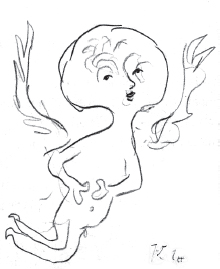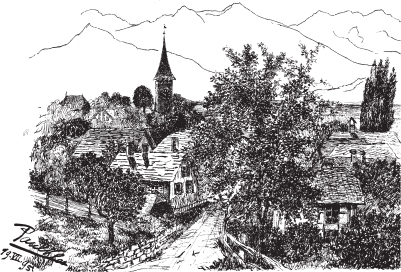The Storyteller (7 page)
Authors: Walter Benjamin

Diary Notes

Head (Bearded Man) (Kopf [Bärtiger Mann])
, 1925.
6
March 1938. Over the last few nights, I have had dreams which remained deeply etched on my day. Tonight, in the dream, I was amid company. People showed much kindness; I believe this consisted mainly of women showing an interest in me, in fact they complimented my appearance. I seem to remember saying aloud, âNow I would not live much longer' â as if they were the last demonstrations of friendship of those who were taking their leave.
Later, immediately before waking up, I was in the company of a lady in the rooms of Adrienne Monnier. Inside was the staging of an exhibition of things, which I can no longer accurately recall. Books with miniatures were among them, and large platters or hammered arabesques, coloured as if covered in enamel. The rooms were on the ground level with the street, from which one could see into the room through a great plate of glass. I found myself indoors. My lady had clearly treated her teeth for some time according to the techniques which this exhibition wanted to promote. She had created an opalescent sheen on them. Her teeth toyed faintly with greenish and bluish hues. I endeavoured to get her to understand, in the most polite way, that it was not the correct use of the materials. Anticipating my thoughts, she pointed out to me that the inner side of her teeth were mounted with red. I had indeed wanted to express that, for the teeth, the strongest colours are just strong enough.
I had suffered very much from the din in my room. Last night the dream retained this. I found myself in front of a map and, at the same time, in the landscape which was depicted on it. The landscape was incredibly gloomy and bleak, and it wasn't possible to say whether its desolation was merely a craggy wasteland or empty grey ground populated only by capital letters. These letters drifted curvily on their base, just as if they were following the mountain range; the words formed from these letters were more or less remote from each other. I knew, or came to know, that I was in the labyrinth of the ear canal. The map was at the same time a map of hell.
28 June. I found myself in a labyrinth of steps. This labyrinth was not covered at all points. I ascended; other steps led into the depths. On a landing I saw that I had come to stand on a peak. A view over all the land opened up. I saw other people
standing on other peaks. One of these others was suddenly gripped with vertigo and plunged down. This vertigo spread around; other people now plunged down from other peaks into the depths. As I too was struck by the feeling, I awoke.
On 22 June, I arrived at Brecht's â¦
â
Translated by Sam Dolbear and Esther Leslie
.
Diary entry, 1938;
Gesammelte Schriften VI
, 532â4.
Review: Albert Béguin
, The
Romantic Soul and the Dream

Debut of an AngelâHeavy Being of an Angel (Debut eines EngelsâSchwerer Anfang eines Engels)
, 1938.
Albert Béguin
, The Romantic Soul and the Dream:
Essays on German Romanticism and French Poetry,
Marseille: Editions des Cahiers du Sud 1937, (two volumes)
T
he predominant part of this extensive work by Béguin is devoted to examinations of German Romanticism. If a shorter characterisation of the French Romantics is included at the end, it is not on account of the interests of comparative
literary history (from which Béguin distances himself [vol. II, 320]). German Romanticism does not present itself to the author as the mother of the French variant, but rather as the Romantic phenomenon par excellence through which the initiation into this movement of the spirit unfolds. For Béguin it is indeed an initiation. The object of study, he writes, engages âthat most secret part of our selves ⦠in which we now only sense a wish, the wish to decode the language of signs and omens, and thus we may get hold of the disconcertment that fills the person who considers human life for one moment in all its strangeness, with its dangers, its alarm, its beauty and its sad limits' (xvii). Considerations in the concluding part are devoted to Surrealist poetry and determine the author's orientation from the outset â a sign, indeed, of how concerned he is to remove himself from the realm of academic scholarship. It should be added that he does not at all relinquish the most rigorous academic standards in his handling of the apparatus of scholarship, even if that is not the case with his method. The book is exemplarily worked through, with precision, without learned pomposity. Due to this commitment, the details here are often as original as they are appealing, irrespective of the problematic aspects of the book's basic position.
The weaknesses of the work are clearly exposed in its allegiant formulations. The author says: âObjectivity, which certainly can and should form the law of the descriptive sciences, cannot fruitfully determine the humanities. In this realm every “disinterested” research includes an unforgivable betrayal of the self and of the “object” of investigation' (xvii). One would not want to raise any objections to this. The error only arises where one tries to align an intensive interest with an immediate interest. The unmediated interest is always subjective and has just as little right in the human sciences as in any other. One cannot
immediately pose the question of whether Romantic doctrines of the dream were âcorrect'; rather, one should explore the historical constellation from which the imaginary Romantic enterprises sprang. In such a mediated interest, which directs itself first and foremost towards the historical state of affairs of Romantic intentions, our own contemporary involvement in the object comes into its own more legitimately than in the appeal to inwardness, which approaches the texts immediately in order to retrieve truth from them. Béguin's book proceeds with such an appeal and thereby has, perhaps, fostered misunderstandings.
André Thérive, who supplies
Le Temps
with literary criticism in the secular tradition, observes of this book that it depends on the opinion that we hold of the purpose of humanity, whether we declare ourselves in agreement with it, or whether we are compelled to find it utterly repellent âwhen the spirit is directed towards the darkness as the only place where it finds joy, poetry, the secret dominion over the universe' (
Le Temps
, August 1937). Perhaps it should be added that the path via the initiates of earlier times is enticing for the adept only if these are authorities, only if they appear to him as witnesses. When it comes to poets that is rarely the case; it is most certainly not true of Romantic poets. Only Ritter might be understood as an initiator in the strict sense. The shaping not only of his thoughts, but of his life, is proof of that. One might also call Novalis to mind and Caroline von Günderode â the Romantics were for the most part too bound up in the business of literature to feature as âguardians of the threshold'. This state of affairs means that Béguin often has to echo the usual modes of procedure in literary history. One can agree with him that these do not quite correspond to his theme. This speaks as much against them as against the theme.
Anyone who undertakes an analysis, as Goethe reminds us, should ensure that a genuine synthesis is at its root. As alluring as the object dealt with by Béguin is, the question remains whether the mindset with which the author approached it can be compatible with Goethe's counsel. Completion of the synthesis is the privilege of historical cognition. The object, as it is sketched in the title, indeed encourages one to expect a historical construction. This would have accentuated more effectively the state of consciousness of the author, and thereby ours, than what discloses itself in his up-to-the-minute considerations of Surrealism and existential philosophy. It would have unmasked the fact that Romanticism completes a process which was begun in the eighteenth century: the secularisation of mystic tradition. Alchemists, Illuminati and Rosicrucians set in train something concluded in Romanticism. The mystical tradition did not survive this process without damage. This was proven in the excrescences of Pietism, as much as the theurgy of figures such as Cagliostro and Saint Germain. The corruption of mystical teachings and needs was just as great in the lower social strata as in the higher ones.
Romantic esoterism grew out of these circumstances. It was a movement of restoration along with all of its violence. With Novalis mysticism was finally able to find a place for itself floating above the continent of religious experience, and even more so in Ritter. Even before the close of late Romanticism, Friedrich Schlegel already shows the secret sciences once again on the point of returning to the lap of the church. The beginnings of a social and industrial development â one in which mystical experience, which has lost its sacramental place, was put into question â coincided with the time of the complete secularisation of mystical tradition. For a Friedrich Schlegel, a Clemens Brentano, a Zacharias Werner, the consequence was
conversion. Others, like Troxler or Schindler, took refuge in evoking the dreamworld, and the vegetative and animal manifestations of the unconscious. They retreated strategically and evacuated areas of higher mystical life in order to consolidate those rooted in nature. Their appeal to dream life was a distress signal; it indicated not so much the return home of the soul to the motherland as the fact that obstacles had already rendered that return impossible.
Béguin did not reach such a conception. He has not reckoned with the possibility that the actual synthetic core of his object, the way it discloses historical cognition, could emit a light in which the dream theories of the Romantics disintegrate. This shortcoming has left traces in the methodology of this work. In its turning to each Romantic writer separately, it reveals the fact that his confidence in the synthetic power of his question is not unlimited. Of course this weakness also has its merits. It gives him the opportunity to prove himself as a portraitist whom it is often truly charming to pursue. It is the portrait studies which make the book worth reading, irrespective of its construction. The first of them, which sketches the relations of sprightly G.Ch. Lichtenberg to the dream life of his fellow humans and to his own, provides a higher sense of Béguin's capability. In his treatment of Victor Hugo in the second volume he delivers a masterpiece in a few pages. The more the reader burrows into the details of these physiognomic showpieces, the more often we will find the correction of an inherent prejudice which might have scuppered the book. A figure such as G.H. Schubert, especially as described by Béguin, shows, with great clarity, how limited the significance is of certain esoteric speculations of the Romantics, which, the more modest the yield that is granted to its immediate pickings, does all the more honour to the historian's loyalty.
â
Translated by Esther Leslie and Esther Leslie
.
First published in
Mass und Wert
2 (1938â9);
Gesammelte Schriften III
, 557â60. Also translated in
Selected Writings 4
, 153â55.
